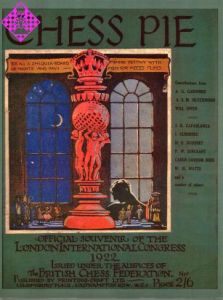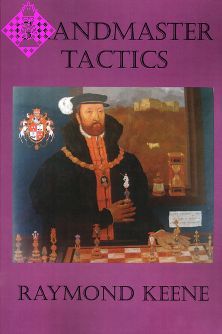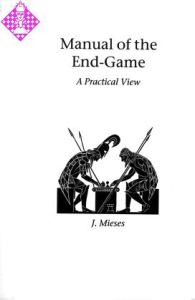Ray Keene was the first British player ever to gain a World Chess Federation Grandmaster result (Nice Olympiad, 1974). He has the rare distinction of having achieved the UK grand slam, winning the British Championship, the Lloyds Bank Masters and the Hastings Challengers, as well as being the highest-placed British player in the Hastings Premier tournament on two occasions. Additionally, he has won first prizes, gold medals and special awards in tournaments, Olympiads, continental and Commmonwealth championships around the world from Adelaide, via Sydney to Hong Kong, Johannesburg, Valletta, Alicante, Barcelona, Gstaad, Berlin, Dortmund, Glasgow and London. He writes on chess for the Times, Sunday Times, Spectator and International Herald Tribune. He has organized three World Chess Championships, written the world record 130 books on the game and has been awarded the OBE for services to chess. This book gives over 190 of his games, with special emphasis on the opening phase. Opponents include World Champions Euwe, Smyslov, Tal and Karpov, as well as challengers for the world title and World Championship candidates Korchnoi, Hübner, Larsen, Geller, Ivkov and Portisch - not forgetting top-rank British grandmasters, masters and champions such as Miles, Nunn, Hartston, Botterill and Peter Lee.
Introduction
This book is a companion to Grandmaster Strategy, also published by Hardinge Simpole. The first volume was a collection of my best games and tournament results arranged in chronological order, a sort of chess autobiography. This second collection ranges from an encounter with World Champion (as he then was) Anatoly Karpov, via games against former Champions Max Euwe and Mikhail Tal, to clashes with world title challengers and candidates such as Viktor Korchnoi, Efim Geller, Robert Hübner and Paul Keres. There are also encounters with leading British players and British Champions including Tony Miles, John Nunn, Peter Lee, George Botterill and William Hartston. Of course there are many other games against di minores, as Alekhine put it.
Although this book is primarily a collection of my games, it is also designed as a teaching manual to demonstrate how effective examples can be translated into wins in one's own chessboard battles. The common theme, whatever the opposition, is to explain the ideas behind the specific type of openings which I consistently favoured over a chess career of around a quarter of a century. For this reason the games have been grouped according to opening variation and theme rather than chronologically. In addition I have, where appropriate, added examples of play by others which exerted a formative influence on my own style or choice of opening, or even on middlegame and endgame strategy.
It will, of course, become apparent which openings were favoured, and hence which style of player this book will attract. As White, I more or less avoided 1 e4, concentrating instead on flank openings and sometimes the more robust 1 d4. Given my early penchant for flank manoeuvres, where I felt at times that the eighteenth-century epithet - willing to wound but yet afraid to strike - might have constituted a just criticism, I surprised even myself with the violence of some of the onslaughts involving the Sämisch Variation against the Nimzo-Indian, or the Semi-Tarrasch Queen's Gambit. As Black, of course, the French, Modern and Pirc defences play a heavy role.
When it comes to the open games beginning 1 e4 e5, these are relegated to the final sections of the book, and although one illustrious name appears, in the shape of World Champion Anatoly Karpov, it is fairly obvious that the position after 1 e4 e5 did not figure hugely in my repertoire. Dr Tarrasch would doubtless have frowned on such a disposition, with the heathen fianchettos coming first and the good old Open Games coming in a poor last. Once upon a time it was considered almost indecent to begin a game of chess with anything other than 1 e4 e5 , but very few of my games conform to that venerable tradition. However, to round the book off, Lessons 49 and 50 offer a few exceptions.
Ray Keene
London, January 2008
Introduction
This book is a companion to Grandmaster Strategy, also published by Hardinge Simpole. The first volume was a collection of my best games and tournament results arranged in chronological order, a sort of chess autobiography. This second collection ranges from an encounter with World Champion (as he then was) Anatoly Karpov, via games against former Champions Max Euwe and Mikhail Tal, to clashes with world title challengers and candidates such as Viktor Korchnoi, Efim Geller, Robert Hübner and Paul Keres. There are also encounters with leading British players and British Champions including Tony Miles, John Nunn, Peter Lee, George Botterill and William Hartston. Of course there are many other games against di minores, as Alekhine put it.
Although this book is primarily a collection of my games, it is also designed as a teaching manual to demonstrate how effective examples can be translated into wins in one's own chessboard battles. The common theme, whatever the opposition, is to explain the ideas behind the specific type of openings which I consistently favoured over a chess career of around a quarter of a century. For this reason the games have been grouped according to opening variation and theme rather than chronologically. In addition I have, where appropriate, added examples of play by others which exerted a formative influence on my own style or choice of opening, or even on middlegame and endgame strategy.
It will, of course, become apparent which openings were favoured, and hence which style of player this book will attract. As White, I more or less avoided 1 e4, concentrating instead on flank openings and sometimes the more robust 1 d4. Given my early penchant for flank manoeuvres, where I felt at times that the eighteenth-century epithet - willing to wound but yet afraid to strike - might have constituted a just criticism, I surprised even myself with the violence of some of the onslaughts involving the Sämisch Variation against the Nimzo-Indian, or the Semi-Tarrasch Queen's Gambit. As Black, of course, the French, Modern and Pirc defences play a heavy role.
When it comes to the open games beginning 1 e4 e5, these are relegated to the final sections of the book, and although one illustrious name appears, in the shape of World Champion Anatoly Karpov, it is fairly obvious that the position after 1 e4 e5 did not figure hugely in my repertoire. Dr Tarrasch would doubtless have frowned on such a disposition, with the heathen fianchettos coming first and the good old Open Games coming in a poor last. Once upon a time it was considered almost indecent to begin a game of chess with anything other than 1 e4 e5 , but very few of my games conform to that venerable tradition. However, to round the book off, Lessons 49 and 50 offer a few exceptions.
Ray Keene
London, January 2008
| EAN | 9781843821885 |
|---|---|
| Weight | 615 g |
| Manufacturer | Hardinge |
| Width | 15.2 cm |
| Height | 22.8 cm |
| Medium | Book |
| Year of Publication | 2008 |
| Author | Raymond Keene |
| Language | English |
| ISBN-10 | 1843821885 |
| ISBN-13 | 9781843821885 |
| Pages | 378 |
| Binding | paperback |
| Name | Hardinge Simpole Publishers |
|---|
vii Introduction
001 Lesson 1 Reti Opening
018 Lesson 2 Smyslov's System: Reti with b2-b4
028 Lesson 3 Nimzowitsch-Larsen Opening
038 Lesson 4 King's Indian Attack
050 Lesson 5 English Opening with e7-e5
059 Lesson 6 English Opening with c7-c5
071 Lesson 7 English Opening: Botvinnik System
075 Lesson 8 An Irregular Flank Opening
079 Lesson 9 Queen's Gambit Accepted and Declined
088 Lesson 10 Queen's Gambit: Tarrasch Defence
094 Lesson 11 Semi-Tarrasch Defence
099 Lesson 12 Queen's Gambit: Slav Defence
109 Lesson 13 Dutch Defence: Leningrad System
115 Lesson 14 Dutch Defence: Stonewall Systems
124 Lesson 15 Nimzo-Indian Defence: 4 Qc2
131 Lesson 16 Nimzo-Indian Defence: Leningrad Variation
139 Lesson 17 Nimzo-Indian Defence: Rubinstein Variation
147 Lesson 18 Nimzo-Indian Defence: Sämisch Variation
155 Lesson 19 Queen's Indian Defence
161 Lesson 20 Budapest Gambit
164 Lesson 21 Old Indian Defence
168 Lesson 22 Tartakower Defence 3...Bg4
175 Lesson 23 King's Indian Defence: Sämisch Variation with Bc1-g5
181 Lesson 24 King's Indian Defence: Sämisch Variation with Bc1-e3
189 Lesson 25 King's Indian Defence: Systems with Bf1-e2
193 Lesson 26 King's Indian Defence: Yugoslav Variation
200 Lesson 27 King's Indian Defence: Panno Variation
204 Lesson 28 King's Indian Defence: A Variety of Fianchetto Lines
213 Lesson 29 King's Indian: A Double Fianchetto Line
218 Lesson 30 Modern Benoni
223 Lesson 31 Grünfeld Defence
234 Lesson 32 Fianchetto Grünfeld Systems
244 Lesson 33 Modern Defence: Variations with c2-c4
260 Lesson 34 Modern Defence: White plays Nb1-c3 without c2-c4
272 Lesson 35 Modern Defence: Variations with c2-c3
279 Lesson 36 Pirc Defence: System with Ng1-f3 and Bf1-e2
287 Lesson 37 Pirc Defence: 4 Bg5
292 Lesson 38 Pirc Defence: 4 f4
307 Lesson 39 Pirc Defence: Avoiding the Main Lines
311 Lesson 40 Sicilian Defence: Dragon Variation
316 Lesson 41 Sicilian Defence: Maroczy Bind
321 Lesson 42 Sicilian Defence: Avoiding the Main Lines
329 Lesson 43 Caro-Kann Defence with 5...gxf6
336 Lesson 44 Caro-Kann Defence with 4...Nd7
340 Lesson 45 Classical Caro-Kann: 4...Bf5
344 Lesson 46 French Defence: Advance Variation
348 Lesson 47 French Defence: Tarrasch Variation
358 Lesson 48 Nimzowitsch's Defence 1...Nc6
365 Lesson 49 Philidor's Defence
369 Lesson 50 Classical Gambit Openings
373 Index of games by players
376 Index of tournaments, etc
001 Lesson 1 Reti Opening
018 Lesson 2 Smyslov's System: Reti with b2-b4
028 Lesson 3 Nimzowitsch-Larsen Opening
038 Lesson 4 King's Indian Attack
050 Lesson 5 English Opening with e7-e5
059 Lesson 6 English Opening with c7-c5
071 Lesson 7 English Opening: Botvinnik System
075 Lesson 8 An Irregular Flank Opening
079 Lesson 9 Queen's Gambit Accepted and Declined
088 Lesson 10 Queen's Gambit: Tarrasch Defence
094 Lesson 11 Semi-Tarrasch Defence
099 Lesson 12 Queen's Gambit: Slav Defence
109 Lesson 13 Dutch Defence: Leningrad System
115 Lesson 14 Dutch Defence: Stonewall Systems
124 Lesson 15 Nimzo-Indian Defence: 4 Qc2
131 Lesson 16 Nimzo-Indian Defence: Leningrad Variation
139 Lesson 17 Nimzo-Indian Defence: Rubinstein Variation
147 Lesson 18 Nimzo-Indian Defence: Sämisch Variation
155 Lesson 19 Queen's Indian Defence
161 Lesson 20 Budapest Gambit
164 Lesson 21 Old Indian Defence
168 Lesson 22 Tartakower Defence 3...Bg4
175 Lesson 23 King's Indian Defence: Sämisch Variation with Bc1-g5
181 Lesson 24 King's Indian Defence: Sämisch Variation with Bc1-e3
189 Lesson 25 King's Indian Defence: Systems with Bf1-e2
193 Lesson 26 King's Indian Defence: Yugoslav Variation
200 Lesson 27 King's Indian Defence: Panno Variation
204 Lesson 28 King's Indian Defence: A Variety of Fianchetto Lines
213 Lesson 29 King's Indian: A Double Fianchetto Line
218 Lesson 30 Modern Benoni
223 Lesson 31 Grünfeld Defence
234 Lesson 32 Fianchetto Grünfeld Systems
244 Lesson 33 Modern Defence: Variations with c2-c4
260 Lesson 34 Modern Defence: White plays Nb1-c3 without c2-c4
272 Lesson 35 Modern Defence: Variations with c2-c3
279 Lesson 36 Pirc Defence: System with Ng1-f3 and Bf1-e2
287 Lesson 37 Pirc Defence: 4 Bg5
292 Lesson 38 Pirc Defence: 4 f4
307 Lesson 39 Pirc Defence: Avoiding the Main Lines
311 Lesson 40 Sicilian Defence: Dragon Variation
316 Lesson 41 Sicilian Defence: Maroczy Bind
321 Lesson 42 Sicilian Defence: Avoiding the Main Lines
329 Lesson 43 Caro-Kann Defence with 5...gxf6
336 Lesson 44 Caro-Kann Defence with 4...Nd7
340 Lesson 45 Classical Caro-Kann: 4...Bf5
344 Lesson 46 French Defence: Advance Variation
348 Lesson 47 French Defence: Tarrasch Variation
358 Lesson 48 Nimzowitsch's Defence 1...Nc6
365 Lesson 49 Philidor's Defence
369 Lesson 50 Classical Gambit Openings
373 Index of games by players
376 Index of tournaments, etc
More from Hardinge
-
 Chess Praxis€33.50
Chess Praxis€33.50 -
 How to beat Gary Kasparov€18.95
How to beat Gary Kasparov€18.95 -
 Chess Treasury of the Air€26.90
Chess Treasury of the Air€26.90 -
 Chess Masterpieces€16.50
Chess Masterpieces€16.50 -
 Chess Pie€24.50
Chess Pie€24.50 -
 Delights of Chess€29.50
Delights of Chess€29.50 - More from Hardinge


